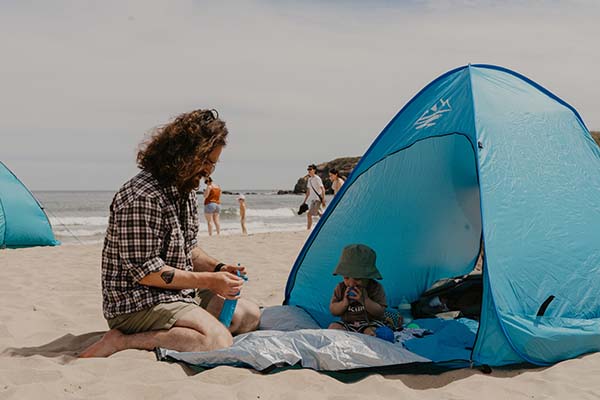If you think camping is only for spring, summer, and fall, think again. Winter camping can be a lot of fun, especially when you know how to stay warm. The warmth factor keeps a lot of campers at home in the winter months, but it may be because they don’t know about tent heaters. Are tent heaters safe? The simple answer is, yes, a tent heater that is in particular designed for use inside a tent is, indeed, protected for use in a tent, or similar limited space, furnished that you observe the manufacturer’s specifications.
Are Tent Heaters Safe
Yes, they are. Just as driving a car is safe, or using a blender is safe, or firing up a blow torch is safe. As with any piece of technology that has the implicit to beget detriment, if treated with respect and used duly, all will be well. By following the manufacturer’s guidelines and exercising your common sense, tent heaters are safe.
That’s not to say you can take any kind of propane-fueled heating device into your tent. Just as you wouldn’t take a Formula One auto on a drive around the city( still fun that may be), you shouldn’t use a heater that’s not specifically designed to be used in a tent, in a tent.
We completely get why tent heaters are a desirable addition to your camping kit. Indeed the stylish camping tents can only do so important to keep us warm and these days you can produce luxurious conditions on your camping trips; it’s called glamping. Still, with the implicit fire risk and tales of carbon monoxide poisoning doing the rounds, we also understand why some people are reluctant. Bear with us, we’ll deal with these perceived troubles one by one.
Of course, it may be that you don’t need to consider a tent heater. plenty of hardy campers seek out the depths of downtime and know how to stay warm in a tent without resorting to heaters and the like. Hot water bottles, hot drinks, a quality kit, a proper insulated sleeping pad and a plenitude of layers can do the trick too.
Do Tent Heaters Give Off Carbon Monoxide
Carbon monoxide is a tintless, odorless and tasteless gas produced by burning wood, watercolor, propane, gas and other energies.
Non-electric tent heaters run on propane or butane, but they’re erected to efficiently burn fuel so that they’re indoor-safe.
Still, you should always bring and use a handheld carbon monoxide detector when you use any kind of fuel-powered heater.
Indeed if a heater is labeled “ inner safe ” and has an automatic low-oxygen shut-off point, all it takes is one malfunction to have tragic consequences.
Although it’s veritably rare, inner-safe combustion heaters can glitch. This includes portable propane gas heaters.

Is It Safe To Use A Propane Heater In A Tent
Propane is a natural gas that’s used in numerous appliances, including use as camping stove fuel. Propane heaters use pressurized gas to toast areas like outside seating areas. You’ve presumably been warmed by a propane heater at some point, enjoying a cold libation or an al fresco meal during the shoulder seasons.
Can You Leave A Tent Heater On All Night
It’s never recommended that you use a tent heater while you’re sleeping.
Just like you wouldn’t leave a portable heater or heat source on while you’re away, you also shouldn’t use one while you’re sleeping.
In fact, right in the Mr. Heater Propane Heater user manual it states in all caps “ never operate the heater while sleeping! ”
Tent heater safety is dependent on numerous effects like venting, using a carbon monoxide detector, and staying aware while the unit is in operation.
Carbon monoxide situations aren’t the only reason to not operate a tent heater while sleeping. There’s also a threat of fire with any energy-powered heat source.
For all of these reasons, we explosively advise against using a tent heater while sleeping inside your tent.
Tips To Safely Use A Tent Heater
Look For An “Indoor-Safe” Tent Heater
When you buy a tent heater, look for an indoor-safe heater. There are numerous boarding heaters on request that are only meant to be used outside. Look for the “ indoor-safe ” label for use inside a tent.
Seek Out Low-Oxygen And Tip-Over Shut Off
Key safety features to look for when opting for a tent heater include a tip-over shut-off medium that can help prevent a fire. Also, you should get a safe tent heater with a low-oxygen sensor and shut-off feature. This will help prevent carbon monoxide poisoning.
Properly Vent Your Tent
Indoor-safe heaters for tent camping are safe to operate with proper ventilation.
Combustion heaters need acceptable fresh-air inflow to operate duly. This means you need to produce fresh air flow in your tent.
While opening the tent window flaps in the winter might feel counter-intuitive, venting is the only way to safely operate small tent heaters.
Crack a couple of windows on opposite sides of your tent to maintain a constant inflow of fresh air.
Know Where To Place Your Heater
Read your heater manual for instructions on where to place your heater. A heater should be placed on a flat, sturdy surface and several feet down from any items that could melt or catch fire.
Use a Carbon Monoxide Detector
Always have and use a carbon monoxide detector when operating a heater in your tent – no exceptions. Be sure that your carbon monoxide sensor has fresh batteries and test the batteries before each use( as in, before you leave for your camping trip).
Never Operate a Heater While Sleeping
You should never operate a tent heater unattended or while you’re asleep. Still, consider using heat packs in your sleeping bag or an electric blanket, If you want a heat source that you can use all night long.





